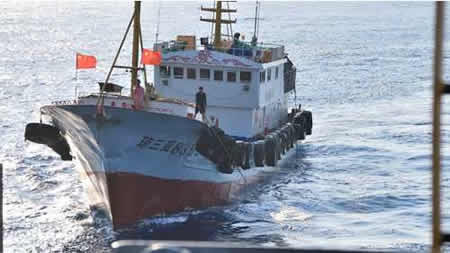Those Chinese sailors who "harassed" a U.S. military vessel lingering perilously close to a Chinese base on Hainan Island, in the South China Sea, reportedly stripped down to their underwear when our sailors turned water hoses on them. Maybe the shower facilities on Chinese fishing vessels – it was fishing trawlers, not military gunboats, that met the Americans on China’s doorstep – are insufficient, or maybe the Chinese were mooning us. I’m inclined to think the latter. In any case, Sunday’s incident ratchets up tensions with China – which have been roiled in recent weeks, not only by a series of similar incidents, but also on account of issues broader than China’s claims to virtually the whole of the South China Sea.
To begin with, the U.S. claims that the USNS Impeccable was manned by civilians and was just going about its undefined business when, suddenly, those big bad Chinese started "harassing" us – the bullies! But wait. Take a look at the Impeccable:

This baby is 5,368 tons, and over 281 ft. long: it is a surveillance ship, designed to track enemy submarines. China’s contingent of nuclear-powered subs are reportedly based at Yulin, on Hainan. And while the U.S. government maintains that the crew is "civilian," half its crew are military personnel.
Now look at the Chinese vessels that were supposedly "harassing" this rather intimidating U.S. warship:


As John Stossel would put it: Give me a break! These are the ships that supposedly “aggressively maneuvered” around the Impeccable – as the Pentagon put it – “in an apparent coordinated effort to harass the U.S. ocean surveillance ship while it was conducting routine operations in international waters"? Behind the whiny rationale, however, lurks a damning admission: Yes, the U.S. routinely spies on the Chinese, and fully expects to get away with it. After all, for centuries foreigners have been lurking on the Chinese coastline, establishing colonies and warily poking and prodding the Chinese, with mostly limited responses – until now.
The Chinese, some analysts aver, are "testing" the Obama administration to see how much they can get away with. They are sending a "signal," we are told, which ought to have been clear enough after the 2001 incident, in which a U.S. surveillance plane was forced to land on Hainan after a collision with a Chinese fighter jet. The fallen Chinese pilot, one Wang Wei, is today a national hero, symbol of a resurgent Chinese nationalism that has little to do with who sits in the Oval Office. In the self-referential parlance of Washington, however, it’s all about a "test" for President Obama.
Imagine if Chinese military vessels appeared 75 miles off the coast of, say, southern California, for the quite obvious purpose of tracking our submarine defenses and conducting surveillance of our San Diego naval base. It would be bombs away, pronto, and no questions asked. However, the Chinese penumbra of sovereignty is apparently more restricted.
Beijing claims U.S. actions violate the UN Law of the Sea, a treaty to which they are signatory and the U.S. is not. However, in contesting this assertion – which came up in the aftermath of the last Hainan incident – U.S. officials routinely note that the UN law, while granting China sovereignty over its "exclusive economic zone," would have been violated only if the Impeccable was on a commercial expedition, and yet the clear concern on the part of the Chinese is that this was a military mission.
We have our Monroe Doctrine, which was specifically aimed at the crowned heads of Europe, who, in our nation’s youth, posed a threat on our very borders. (This same doctrine, ironically, was later tweaked and twisted into a rationale for our own imperial ambitions in South and Central America, as well as Mexico.) Other nations, however, are not entitled to a Monroe Doctrine of their own: China, Russia, and Iran have no corresponding prerogative to their own spheres of influence, as granted by geography, tradition, and the military necessities of a credible defense. It is a consistent application of the Bushian doctrine of preemption: to assert a "right" that is neither a matter of settled international law nor the subject of a treaty, and is clearly provocative in the extreme. What are we doing in China’s backyard?
For decades, the Taiwan lobby has bought and manipulated U.S. politicians and succeeded in passing legislation that requires the U.S. to provide for Taiwan’s security needs, including going to war in case its disputed sovereignty is violated. A huge arms sale under the Bush administration was orchestrated as a result of this unique legislation, which is a monument to the power of foreign lobbyists in the Imperial City.
Hey, wait a minute, aren’t we’re supposed to be in a new era here, with the ascension of Obama I to the imperial throne? One would think that such Bushian orthodoxies as the Wolfowitz doctrine – which assumes U.S. military supremacy on every continent – would be thrown in the dustbin of history. This is apparently not the case: the U.S. continues to assert its imperial prerogatives as if nothing has changed, as indeed it has not.
The administration has made a big show of abjuring torture and repudiating the legal doctrines that underpin it, but that’s just an ordinary sense of decency, the least we might expect from the savior of our national honor. Now what about repudiating the military doctrines that were the foundations of George W. Bush’s crazed foreign policy? Let’s give the doctrine of military preemption – you know, the whole rationale for our disastrous Iraqi adventure – the heave-ho. The real change that’s needed when it comes to the conduct of our government in relation to the rest of the world would be the abandonment of our legendary arrogance, which presumes our leading role on the world stage.
Bush and his neocon supporters gloried in what Charles Krauthammer exultantly deemed "the unipolar moment," but that moment has clearly passed. Indeed, it may have passed even as Krauthammer announced it. The Washington-based analysts are all atwitter about what prompted the Chinese to move on this front – even as U.S.-Chinese negotiations have been deemed a success and a visit to Washington by China’s foreign minister is planned.
Yet the Chinese, even more than we, are well aware that America’s moment may be passing. The biggest holders of U.S. debt are Chinese state-owned companies. No wonder they’re resentful of our spy ship trawling their coastline: after all, they paid for it. What ought to be worrying the Obama administration is that the interest they’re getting on their loan may not be enough to cover their national pride deficit. We may have the mightiest military in the world, but if the Chinese stop buying our debt, then the whole structure of the American warfare-welfare state will come tumbling down with astonishing rapidity.
There is plenty of anti-Chinese political sentiment in this country, and it’s a constituency that is bipartisan. Among the Democrats, you have organized labor, which is instinctively Sinophobic in this country and always has been, as the history of the oppression of Chinese coolies in California amply demonstrates. The protectionist unions are in a lather about the fact that Chinese workers produce cheaper and better products that American consumers want to buy. In tandem with international do-gooders of every sort, the anti-China popular front also consists of Republicans of the sort who will welcome any fresh enemy, as long as it means more subsidies for the military-industrial-congressional complex. Throw in the wacko cultists of Falun Gong, and what you have is the reincarnation of the old, bipartisan anti-Communist alliance of yesteryear, which brought us wars in Korea and Vietnam – and may yet succeed in provoking a third war on the Asian landmass, one just as futile and unwinnable as its predecessors.
The formulation of American foreign policy is all about domestic political pressures. It is the domain of lobbyists and de facto foreign agents, most of them unregistered, who work with targeted American constituencies to further various commercial and foreign interests. A rational foreign policy, i.e., one that serves authentic American interests, is virtually impossible in these circumstances.





